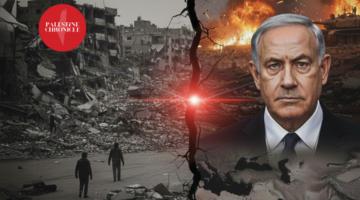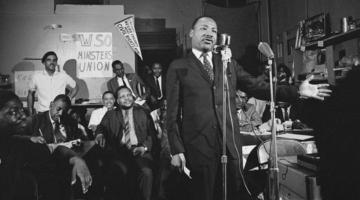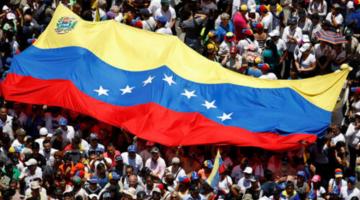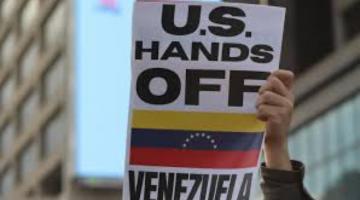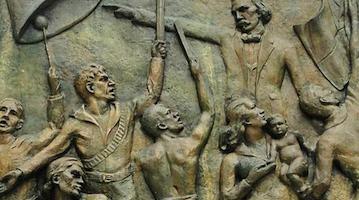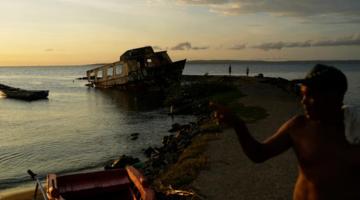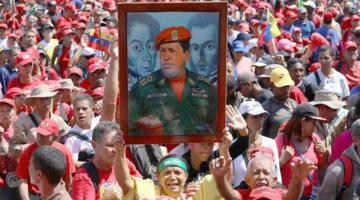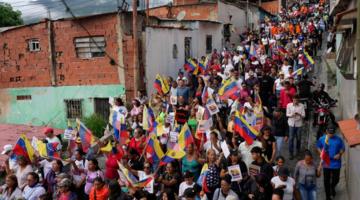The ICC Chief Prosecutor Karim Khan announces the application for arrest warrants for Israeli and Hamas officials.
Ajamu Baraka, Black Agenda Report contributing editor, discusses his thoughts on the request for International Criminal Court (ICC) arrest warrants for Israeli and Hamas officials with Executive Editor Margaret Kimberley. The request for warrants is more of a political act than a legal one and is meant to give the ICC political cover for its inaction on Israel’s war crimes. This process won’t save the U.S. and Israel from scorn and condemnation.
Margaret Kimberley: We are joined by Ajamu Baraka, a Black Agenda Report contributing editor, Chair of the Black Alliance for Peace Coordinating Committee, and a former Green Party vice presidential candidate. We will discuss the International Criminal Court, the ICC, and the announcement that Chief Prosecutor Karim Khan is applying for arrest warrants of Israeli Prime Minister Benjamin Netanyahu and Defense Minister Yoav Gallant who, “bear criminal responsibility for a number of international crimes committed since October 8, including starvation as a weapon of war, murder, intentionally attacking civilians, extermination, persecution, and other crimes against humanity." But the ICC is also applying for warrants for Hamas Politburo leader Ismail Hania, Gaza leader Yahya Sinwar and the chief of its military wing, Mohammed Dief, saying they are responsible for crimes including extermination, murder, hostage taking, torture and rape.
So Ajamu when I first heard this news, I was happy, because it seemed that the ICC was finally taking some action against the Israelis. Except it turns out, they are also saying that warrants are justified for Hamas. And they include crimes that are dubious, the mass rape story has been pretty much debunked. So it seemed like there was some cause for some satisfaction, but not really. So tell us what it is we should be paying attention to when we talk about these ICC warrants.
Ajamu Baraka: Well, I think what we need to perhaps consider is that this announcement is probably more a political move than even a legal one. And what do I mean by that? The ICC was under tremendous pressure, to in fact, do something. It was quite clear that we were witnessing a genocidal act on the part of the Israeli state. And the call continued to be “Where is the ICC?” Where is the International Criminal Court, we saw how quickly they moved to create a really, talking about a dubious case, this dubious case that was created and a warrant issued against the President of the Russian Federation.
But it appeared that when it came to a live stream genocide, the ICC and all of the other Western institutions that normally pretend to be defenders of human rights, needed more evidence, they couldn't make the call. It wasn't really until the South Africans submitted their request to the International Court of Justice in an 84-page indictment of Israeli actions, that even the west, other Western institutions felt compelled to at least say something. It was that political pressure, they began to moderate some of the unconditional support that the Biden administration and other politicians in the US were giving to the slaughter of Palestinians in Gaza. So this move here, in some ways, I see this as a move to try to at least shore up or maintain some credibility for that institution, the International Criminal Court. And of course, the target couldn't just be on this state actor Israel, but they had to bring in the leadership of one element of the Palestinian resistance, the resistance that under international law is clearly legal. And to do that, they had to then introduce as you said in your intro accusations that some will be, I guess, affirmed. There's no question that there were Israeli citizens taken. But others have been clearly debunked. So you know then they have a second step that they announced, this announcement that we haven't seen before, and it's part of the process of seeking the arrest warrant. And that suggests to me that we need to watch that process very closely. Because there's going to be tremendous political pressure to intervene, to undermine that process, and to try to make sure that the actual arrest warrants aren't really issued. So those are the things we need to be looking at, as this saga unfolds.
MK: And we see, you know, cries of outrage from U.S. politicians, from President Biden. Are these crocodile tears? Knowing that there was pressure they knew this was coming. It's been rumored for some weeks now. What do you think about their reaction? What should we make of it?
AB: It was predictable. And what we should do is to completely ignore it. That this situation is the situation that US officials allowed to get out of hand, when they gave a green light to the assault on Gaza, and seemed to be unable to put any kind of real constraints on the Israelis. And now we know that has been part of that special relationship between the United States and Israel for quite some time. But when it became clear that in dealing with the most vicious and right wing government ever in Israel, that this government was clearly engaging in behavior that was going to have a detrimental impact on U.S. policy in the Middle East, and U.S. standing globally. But they seem to be unable to put any real constraints. Instead, he started playing public relations games, suggesting that the Biden administration was opposed to so many actions while at the same time giving a nod and a wink to the, to the continuation of that action. And so it was almost inevitable that something like this had to happen, this announcement. And it is going to be almost inevitable that the International Court of Justice is going to have to rule in favor of the South African petition. There's no way they can get around it. They've been twisting and turning and trying to figure out a way I think, for some of them. But this is the consequence of hubris on the part of the Israelis and ineffective leadership on the part of the United States of America that has created this public relations and political crisis for the U.S. and for Israel.
MK: And I have a question for you about the International Criminal Court, the ICC in general. What does the ICC actually accomplish? Since it came into being they have prosecuted a few Serbians in the Yugoslav war, but mostly Africans. The leaders of the collective West, the presidents of the U.S. and the Prime Ministers of the UK and the presidents of France go untouched, no matter what they do. They can destroy Libya, they can try to destroy Syria, they can back Israel in its current campaign. What good is the ICC?
AB: You know, I think that's a very legitimate question. And I think one way of looking at this ICC, this International Criminal Court is to be reminded that this, even though it came into force in the 1990s, this was an idea that was floated right after the end of the second imperialist war or World War II. It was seen as a weapon that could be used primarily against the Soviet Union and their allies. And that's one reason why it was never allowed to be fully created and implemented of course. It wasn't really until the 1980s with the transition that was taking place with the dissolution of the Soviet Union, and the moves toward a global unipolar world with the U.S. as the main hegemonic force that the ICC was finally consolidating. And as you rightly point out, who has been the target of this International Criminal Court? But those states and leaders, they found themselves on the other side of U.S. concerns, the Serbians, various African dictators, once they fell out of favor with the U.S., because the U.S. still works with a number of African dictators.
So the court being politicized has always been a fear. And once it was, in fact, put in place, it became a reality. And so there's nothing we have gotten from that, meaning oppressed people, has been added to the arsenal of structures and institutions that the selective West has been utilizing for the last few decades. But, again, they felt compelled to have to do something, because they recognize that not only the officials and who make up the International Criminal Court, but many, many Western officials around all across Western Europe, understand that the entire security architecture, the entire network of structures, institutions that have been effectively utilized to project Western Power, with legitimation now under threat. The crisis of legitimacy is real Margaret, and they had to make a move. And that's why you saw start seeing that the messaging coming from elements in the U.S. and even Western Europe, regarding the assault on Gaza, was messaging that started to focus on Benjamin Netanyahu, as in fact the fall guy as opposed to the the Israeli colonial project, because they wanted to make sure that that project continue. And so the focus had to be on Netanyahu.
And that's why for many of us, we believe that this ICC move is in fact, a sham. But a sham not for the reasons, some people in the West in particular in the US may think, but a sham because it did not go far enough. The fact of the matter is, if there's going to be real accountability, then the paymasters need to be included, the individuals making decisions that allow for the the genocide to go forward. Joe Biden, President Joe Biden of the United States of America, his Secretary of State, Antony Blinken, and even the defense secretary, Lloyd Austin, at minimum, should be included in the indictments.
MK: Before we go Ajamu is there anything I didn't ask that you want to talk about?
AB: Well, you know, this is a culmination of a process, a process of providing legitimacy to western U.S. colonialism for the last few decades. And this process has now been exposed for the fraud, that it really is, including the some of the most effective weapons that they were creating over the last few decades, this notion of humanitarian intervention, and the responsibility to protect, both interrelated concepts that reflected this continuation of this white man's burden, if you will, this white saviorism to go in and to protect the natives who are being subjected to dictatorial policies, where their rights are being violated, etc. But that concept has been exposed for what it has been that basically there's been no rescue, there's been no saving of the Palestinians.
So everything they provide has some degree of legitimacy to the west, and in particular to the US has been completely destroyed, they have no standing. And so this ICC indictment is part of sort of a desperate attempt to try to rescue some credibility for Western based institutions. But unfortunately, it is too little too late. The deed has been done, and there is no returning in terms of any kind of international status and prestige for both Israel and the United States of America. In fact, the Israeli settler colonial project is just about done, Margaret. So this is, these are the kinds of things we need to do to watch and be aware of. And understand that with this exposure, and the inability of these forces to use the ideological weapon to maintain dominance, that's why we've seen more, more reliance on violence, on violent repression. That's why we saw the attacks against students across the country in the United States of America. And we expect that that's only going to intensify not only against students, but all opposition, just ask Omali Yeshitela and the Uhuru Three. This is what we have before us in the immediate future.
MK: Thank you so much, Ajamu. And that was Ajamu Baraka, Black Agenda Report contributing editor, discussing the International Criminal Court and the application of arrest warrants for Israeli and Hamas officials. Thank you so much.
Margaret Kimberley is the author of Prejudential: Black America and the Presidents. You can support her work on Patreon and also find it on the Twitter, Bluesky, and Telegram platforms. She can be reached via email at margaret.kimberley@blackagendareport.com.
Ajamu Baraka is the national organizer of the Black Alliance for Peace and an editor and contributing columnist for the Black Agenda Report. Baraka serves on the Executive Committee of the U.S. Peace Council and leadership body of the U.S.-based United National Anti-War Coalition (UNAC) and the Steering Committee of the Black is Back Coalition.



